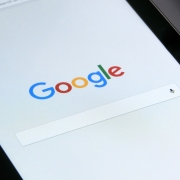- The most relevant SEO News for February 2020 - 26. February 2020
- The most relevant SEO News for January 2020 - 21. January 2020
- The most relevant SEO News for December 2019 - 23. December 2019
- The most relevant SEO News for November 2019 - 25. November 2019
- Don’t be afraid of Google’s BERT - 31. October 2019
- The most relevant SEO News for October 2019 - 31. October 2019
- The most relevant SEO News for September 2019 - 25. September 2019
The New Year is not giving us any breathers. The New Year’s Eve fireworks have barely died down and we are already invited to enthuse about the long-awaited relaunch of an important tool. How it’s not too long before we’ll be browsing with our reading glasses and why voice assistants are likely to get on our nerves soon – this and more you’ll find out in the SEO News bulletin for February.
1) Hooray, the new Google Search Console is here!
With the start of the New Year, the mailboxes of webmasters, in-house SEOs and agencies far and wide have been overwhelmed with countless emails. What initially looked like spam soon turned out to be a long-awaited message from Mountain View. After a test phase lasting many months, the new Google Search Console is now available to all users. Though officially still in its beta phase, the data portal for monitoring the organic search aspect of website performance formerly known as Webmaster Tools has had its design completely overhauled. Alongside its fresh look, the Search Console also offers real improvements, such as access to historical data from the last 16 months instead of the previous mere 90 days. There are new functions too, like the Index Coverage Report, which enables superior tracing of the search function performance for individual URLs. Although some basic functions are still missing, Google has announced that it will further expand the range of functions for the new Console within the year. At the same time, new functions will also be added to the API. The fact that the highly-anticipated rollout took so long was mainly due to the need to collect and evaluate the beta testers’ feedback, a Google spokesperson said. Google is also still interested in Webmasters’ input. They have been asked to submit ideas to Google for useful reports and functionalities. SEOs and Webmasters should not let this opportunity slip by to further adapt one of the most important tools of the sector to the changing needs of our time.
2) Voice search ranking: new study reveals first figures
The British online performance agency Roast has run a study to investigate the connection between rankings of classic Google search results and responses of the Google Home digital voice assistant. To this end, 616 top search terms from the areas of medicine, retail, travel and finance were entered as queries, and in the UK, an “answer box”, the so-called featured snippet, was shown as the search result. The Google Home voice assistant could answer roughly 75% of the queries through its automated search process; the remaining 25% left Google speechless, although the desktop search showed a corresponding answer box. No statement could be made about the rules governing the answers displayed, as the study shows. What’s more, about 20% of the queries answered by the voice assistant did not tally with the featured snippet on the desktop. For search marketing, these results mean that a successful battle for featured snippet ranking in a desktop search is far off from guaranteeing an equivalent reception on Google Home, and the Google My Business tool is still indispensable for managing information that serves search queries for local services.
3) Visual search on the rise
While we’re still waxing lyrical about the influence of voice search on digital marketing, AI is yet again opening up totally new avenues. With new apps like Google Lens and Pinterest Lens, as well as expanded functions on Microsoft’s search machine Bing, we’re advancing in the visual search era. Since the early days of Google we have been able to look for images using key words; later came reverse search for image files with the aid of structured data. In the next developmental step of visual search, AI will recognize the content of photos or only sections of images, completely without context, and will not only come up with similar images in its results list, but also detailed information on the properties of the depicted object. For the e-commerce sector, this means a new access point on the customer journey. Information searches and purchase decisions can be conducted quickly and intuitively. The need to translate your own search purpose into a written or spoken search phrase becomes obsolete; results are instantly reflected in an augmented image. For search engine optimization, this development means that providing product information via automated data feeds and data banks will become even more important. In this way, suitable information be stored in the search systems and successfully served by this kind of push paradigm. The transferred content – images and text – need to be optimized for quality and relevance and be able to excel as structured data in order to take their place in the competitive data world. The integration of visual search in cameras, browsers and apps will take place very quickly and accelerate the transition from on-page to data optimization even further.
4) Alexa gets her own opinion
In the meantime, we know that digital voice assistants like Alexa and Siri have female voices because studies verify that both men and women find the female voice more trustworthy than its male equivalent.
But apart from fact-based question-and-answer exchanges, so far it has not been possible to carry on a conversation with the voice assistants. This should now change through an Amazon decision. According to Techcrunch, Alexa will be endowed with her own opinion and also express this confidently in conversation with her user. By way of example, the company gives comments on films in its own video product range. As she once did with the funny character at the video shop counter, (the older reader will remember this), in future Alexa is intended to start up conversations with users looking for the right evening entertainment – which will not be based on content curated by humans. Instead the artificial intelligence of the voice assistant will independently generate the necessary portion of attitude and humour that is crucial for lifelike conversation in all its nuances and suitable for the market. With use of this strategy, Amazon expects to win an advantage over its competitor Google, which has recourse to information and facts from a disparately larger data set, a company spokesperson has explained. Thus, Alexa is today already declaring the US beer brand Budweiser to be her favourite drink. Humour aside, a machine’s skill in conducting a natural conversation with a human will shape and change the future of search marketing in a more decisive way than any leap in technology we have experienced so far.
This page is available in DE







